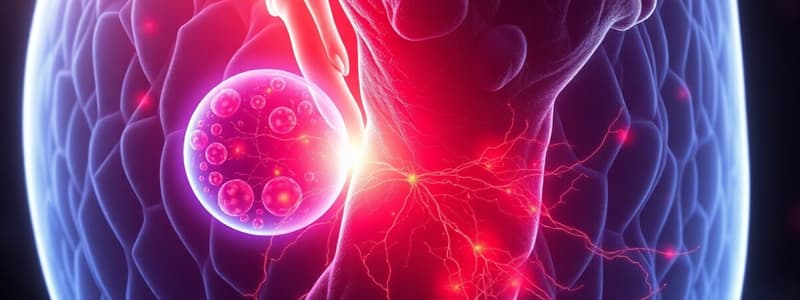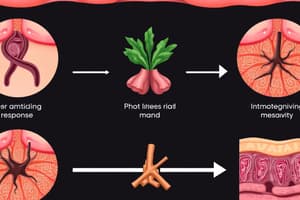Podcast
Questions and Answers
Which dressing is generally considered most effective for promoting a moist wound environment?
Which dressing is generally considered most effective for promoting a moist wound environment?
- Contact layer dressings (correct)
- Plastic wrap dressings
- Adhesive bandages
- Gauze dressings
What factor is NOT considered when selecting a dressing for a wound?
What factor is NOT considered when selecting a dressing for a wound?
- Type of the wound
- Weather conditions (correct)
- Amount of exudate
- Location of the wound
How can age affect wound healing in animals?
How can age affect wound healing in animals?
- Older animals may have impaired healing capacity. (correct)
- Younger animals heal faster than older ones.
- It increases the chances of infection.
- Age does not influence wound healing.
Which of the following is a crucial technique in wound care?
Which of the following is a crucial technique in wound care?
What is a potential risk of using certain materials for wound dressings?
What is a potential risk of using certain materials for wound dressings?
What is the primary focus of the inflammatory phase in wound healing?
What is the primary focus of the inflammatory phase in wound healing?
Which of the following is NOT a key characteristic of inflammation?
Which of the following is NOT a key characteristic of inflammation?
During the inflammatory response, what occurs during vasodilation?
During the inflammatory response, what occurs during vasodilation?
What role do alginate dressings play in veterinary wound care?
What role do alginate dressings play in veterinary wound care?
Which phase of wound healing is characterized by reorganization of collagen fibers?
Which phase of wound healing is characterized by reorganization of collagen fibers?
What is a benefit of maintaining a moist wound environment?
What is a benefit of maintaining a moist wound environment?
What type of dressing is primarily used to protect the wound while providing a moist environment?
What type of dressing is primarily used to protect the wound while providing a moist environment?
Which of the following is a key event that occurs during the inflammatory response?
Which of the following is a key event that occurs during the inflammatory response?
Flashcards
Contact Layer Dressings
Contact Layer Dressings
Dressings that protect the wound bed and promote healing.
Gauze Dressings
Gauze Dressings
Dressings that absorb fluid from wounds but may not be ideal for promoting moisture.
Nutritional Status
Nutritional Status
The state of an animal's nutrition, which can impact wound healing.
Debridement
Debridement
Signup and view all the flashcards
Wound Irrigation
Wound Irrigation
Signup and view all the flashcards
What is the inflammatory response?
What is the inflammatory response?
Signup and view all the flashcards
What are the main events in the inflammatory process?
What are the main events in the inflammatory process?
Signup and view all the flashcards
What is the inflammatory phase?
What is the inflammatory phase?
Signup and view all the flashcards
What is the proliferative phase?
What is the proliferative phase?
Signup and view all the flashcards
What is the remodeling phase?
What is the remodeling phase?
Signup and view all the flashcards
What are the main functions of veterinary wound dressings?
What are the main functions of veterinary wound dressings?
Signup and view all the flashcards
What are some types of veterinary wound dressings?
What are some types of veterinary wound dressings?
Signup and view all the flashcards
Why are a moist environment and exudate absorption important for wound healing?
Why are a moist environment and exudate absorption important for wound healing?
Signup and view all the flashcards
Study Notes
Inflammatory Process
- The inflammatory response is a complex biological reaction to tissue injury, infection, or irritation.
- It's a crucial initial step in wound healing.
- Key characteristics include:
- Redness (erythema): Increased blood flow to the affected area.
- Heat (calor): Increased temperature due to increased blood flow.
- Swelling (tumor): Accumulation of fluid in the tissues.
- Pain (dolor): Stimulation of nerve endings.
- Loss of function: Impairment of tissue due to the inflammatory process.
- The process involves a cascade of events:
- Vasodilation: Blood vessels dilate to increase blood flow to the injury site.
- Increased vascular permeability: Blood vessels become more permeable, allowing fluid and immune cells to leak into the tissue.
- Cellular migration: Immune cells, such as neutrophils and macrophages, migrate to the injury site to eliminate pathogens and debris.
- The inflammatory phase typically lasts for several days.
Wound Healing Phases
- Wound healing involves a series of overlapping phases, including the inflammatory phase, proliferative phase, and remodeling phase.
- Inflammatory phase: Focuses on removing debris and pathogens.
- Proliferative phase: New tissue formation, angiogenesis (formation of new blood vessels), and collagen synthesis occur.
- Remodeling phase: Strengthening of the new tissue through reorganization of collagen fibers and tissue maturation.
Veterinary Wound Dressings
- Veterinary wound dressings serve various functions:
- Providing a moist wound environment: Promotes healing by maintaining a balanced moisture level.
- Protecting the wound from contamination: Prevents infection through a mechanical barrier or antimicrobial properties.
- Absorbing exudate: Manages drainage and prevents maceration (excessive softening of tissue).
- Promoting granulation tissue formation: Supports cell regeneration and wound healing.
- Maintaining a sterile environment: Prevents bacterial entry at the wound site.
- Enhancing epithelialization: Encourages cell regeneration and skin closure.
- Types of dressings include:
- Alginate dressings: Natural fibers that absorb large amounts of exudate.
- Hydrocolloid dressings: Provide a moist environment and absorb exudate.
- Hydrogel dressings: Provide moisture and enhance tissue regeneration.
- Foam dressings: Absorb exudate and provide cushioning.
- Film dressings: Protect and maintain a moist environment.
- Contact layer dressings: Help protect the wound bed.
- Gauze dressings: Absorb exudate; less effective for promoting a moist environment.
- Selection depends on:
- Type and severity of wound: Dressings vary for deep wounds, infected wounds, and wounds with high exudate.
- Amount of exudate: Different dressings are suitable for different exudate levels.
- Location of the wound: Dressing selection considers anatomic location.
- Pain and discomfort: Some materials cause less discomfort than others.
- Potential complications: Some dressings are better suited for wounds facing infections or other complications.
Considerations in Veterinary Wound Healing
- Factors affecting wound healing in animals include:
- Nutritional status: Malnutrition hinders wound healing.
- Age: Younger and older animals may have altered healing capacity.
- Underlying diseases: Conditions like diabetes and immune deficiencies can impede the healing process.
- Medications: Some drugs negatively impact healing.
- Proper wound care, including appropriate dressing selection and a sterile environment, is crucial for successful veterinary wound healing.
- Wound cleaning techniques are essential to facilitate healing:
- Mechanical debridement removes necrotic tissue.
- Irrigation removes debris and maintains hygiene.
- Avoid overcleaning to prevent damage to healthy tissue.
Studying That Suits You
Use AI to generate personalized quizzes and flashcards to suit your learning preferences.




